Table of Contents
SYNOPSISINTRODUCTION
PERSONA
THE SHADOW
INDIVIDUATION: YOU, ME, WE. THEM, US AND I
WHAT IS A CULTURAL COMPLEX
THE INTER-PLAY BETWEEN GROUP AND INDIVIDUAL
GROUP THINK
CASE STUDY
CONCLUSIONS / REFLECTIONS
REFERENCES
CONTACT
Understanding the relationship between self and the cultural complex.
Understanding the relationship between self and the cultural complex.
SYNOPSIS
GoTop
Changing culture is more than Mission, Vision, Values, OKRs and KPIs, or the cultural web (Stories; Rituals and Routines; Symbols; Organizational Structure; Control Systems; Power Structures). If we are all part of the organization it needs to include an understanding the relationship between self and the cultural complex. Who are we really: 1. as part of the organisation, 2. as someone distinct and separate, 3. in our relationship with others.
There is a lot to unpack, but very interesting and rewarding in terms of insights, so I have taken the following approach.
1. Explain the idea of persona and shadow, that we all wear a mask and have a part of ourselves that we hide from others, and ourselves.
2. Talk about this “dark-side” shadow and the process of individuation: finding, defining, maturing our “self” as opposed to the persona mask.
3. Introduce the idea of cultural complex(s) which is a group, clique, ritual, symbol type feeling or vibe. More subtle, subconscious and complex than simple “the way we do things here” definition of culture.
4. I then talk about the relationship between the individual and the group, our psyche or shadow and the cultural complex(s).
5. I then move on to how being too close might lead to group-think and too far to anxiety, depression, exile.
6. I finish with an exploration of the cultural shadow, and its impact on organizations and individuals.
INTRODUCTION
GoTop
Below is an essay of thoughts and reflections, from this thought-provoking book: A Jungian Approach to Coaching The Theory and Practice of Turning Leaders into People By Laurence Barrett
My opinions are not necessarily those of other book club participants or the author. I am using this definition of essay: analytic or interpretative literary composition usually dealing with its subject from a *limited or personal* point of view as a caveat that this is neither comprehensive or authoritative, and with that in mind I welcome feedback, suggestions and recommendations for further reading.
PERSONA
GoTop
Our persona (the mask we wear for the situation we are in) is curated by the “ego” which is constantly managing the emotions and the feeling and thoughts that are triggered by them.
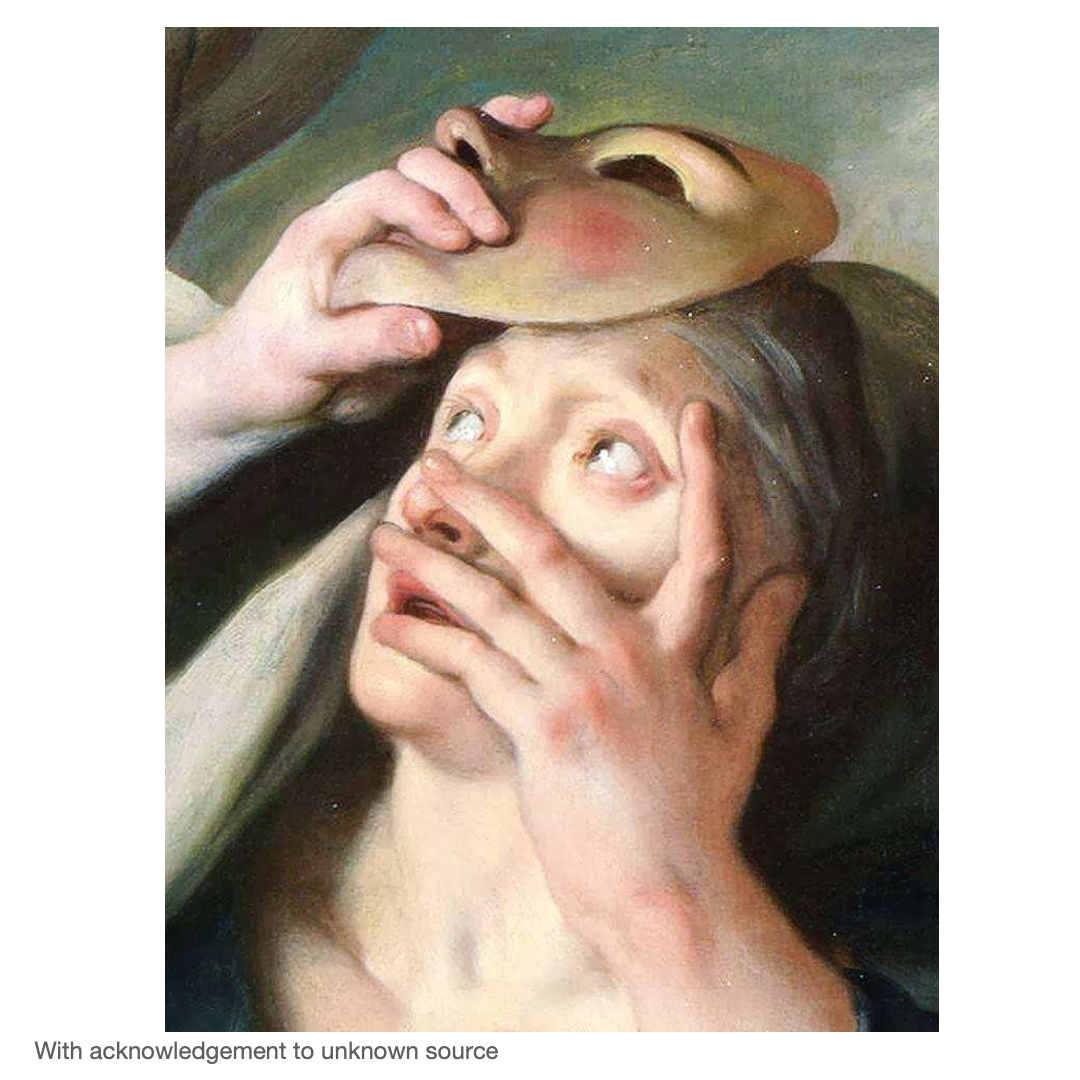
Nature, nurture, conscious and subconscious, mind, body and others provide all the “data” that the ego and id will perceive and process. The id is like a “me, me, me” child obsessed with self. The ego is more measured, taking account of context.
The ego manages the thought-out responses, and may try to override or repress the otherwise instinctive or trigger reactions of the “id” in a constant process necessary to protect the self and manage the situation.
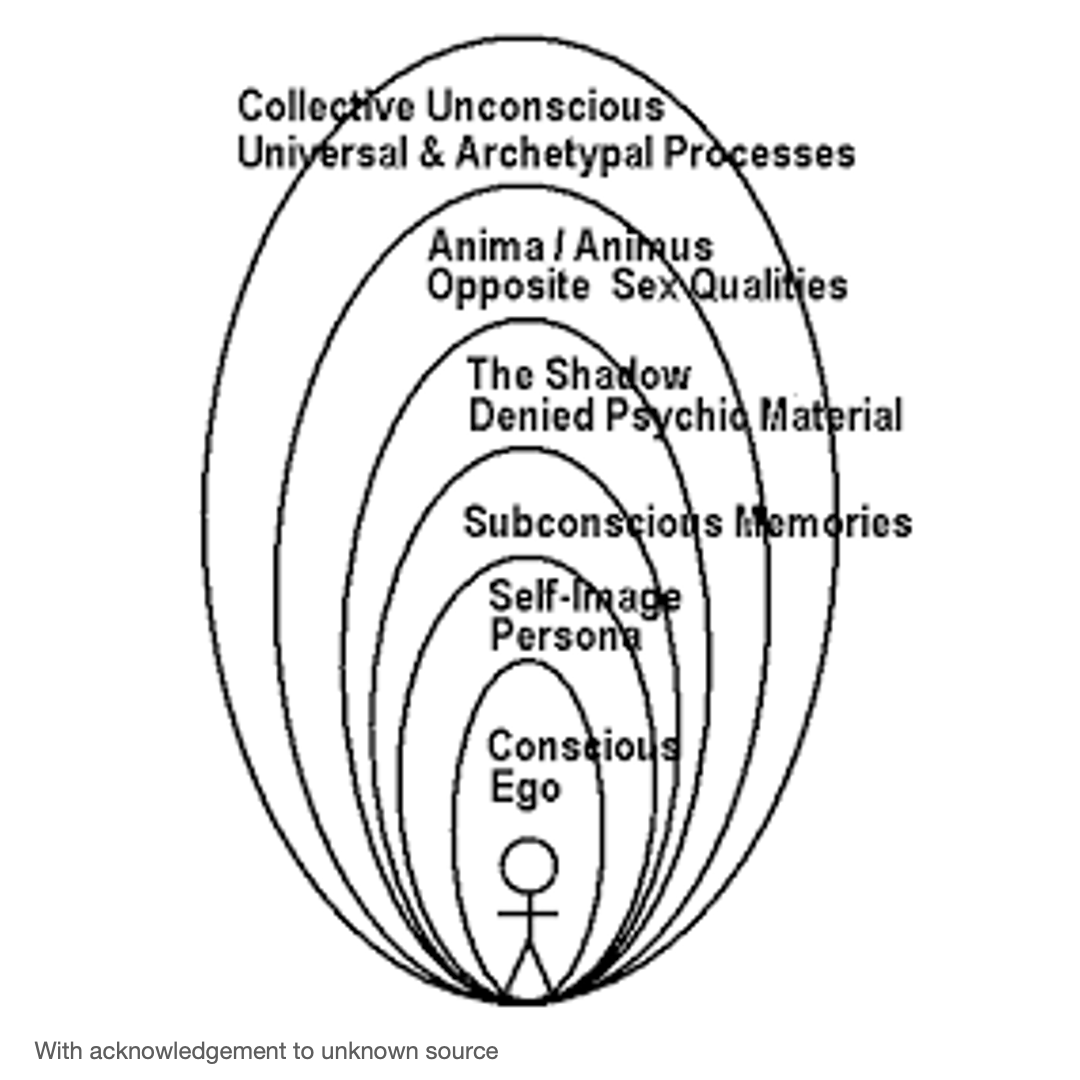
This is a very complex and adaptive set of processes and patterns operating between mind and body, self and other. Sometimes even the smallest change (sleep, food, sound, exercise, breathing) can change the pattern and therefore the perception, meaning and response.
THE SHADOW
GoTop
The shadow exists as part of the unconscious mind and is composed of repressed ideas, weaknesses, desires, instincts, and shortcomings. The shadow forms out of our attempts to adapt to cultural norms and expectations.
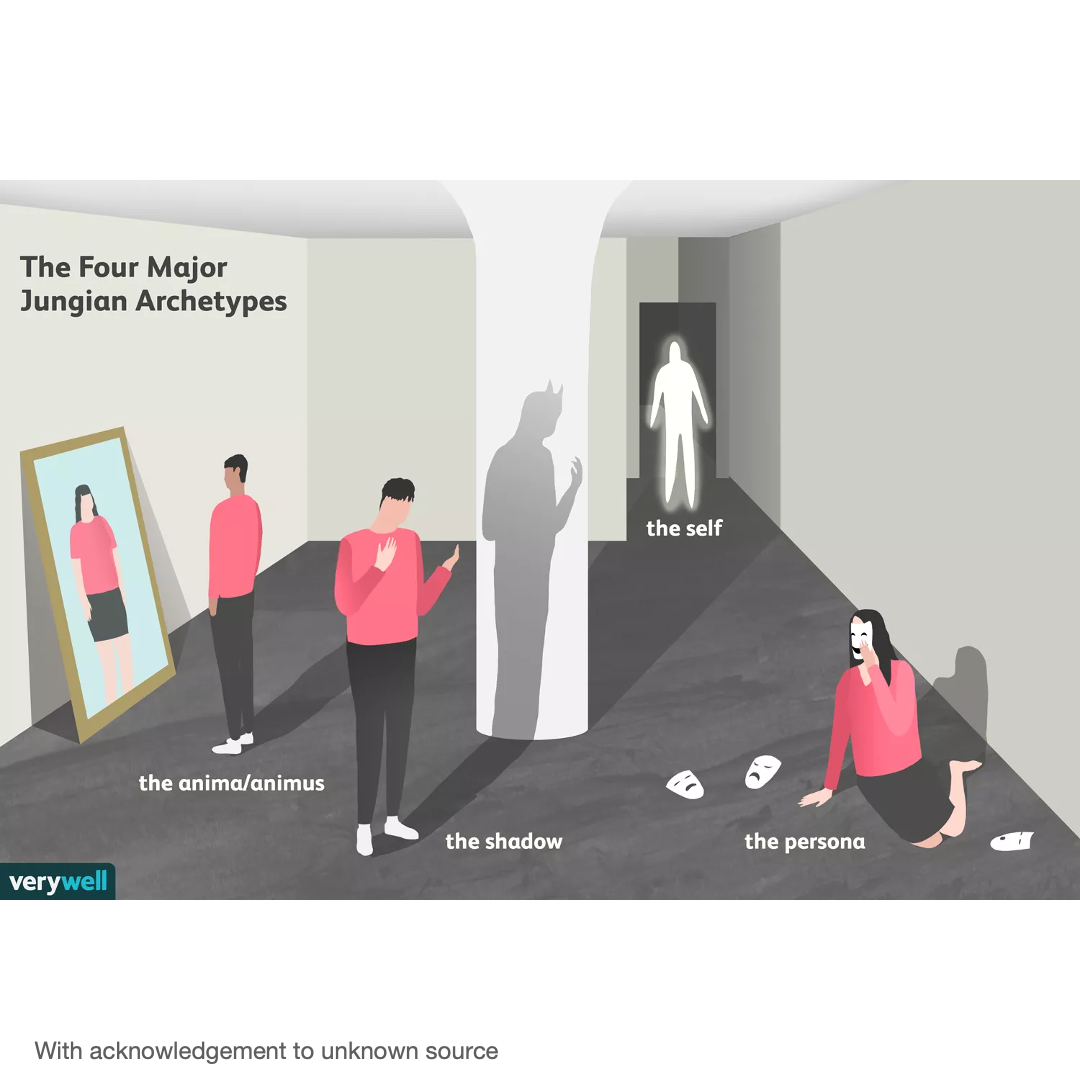
Jung had a deep interest in the shadow – its form and content – and in the process of assimilating “the thing a person has no wish to be” [CW16, para 470]. He saw quite clearly that failure to recognise, acknowledge and deal with shadow elements is often the root of problems between individuals and within groups and organisations; it is also what fuels prejudice between minority groups or countries and can spark off anything between an interpersonal row and a major war.
A cultural complex can have a shadow. That part that it hides, does not discuss, avoids acknowledging.
INDIVIDUATION: YOU, ME, WE. THEM, US AND I
GoTop
When discussing human development, individuation refers to the process of forming a stable personality. As a person individuates, they gain a clearer sense of self that is separate from their parents and others around them.
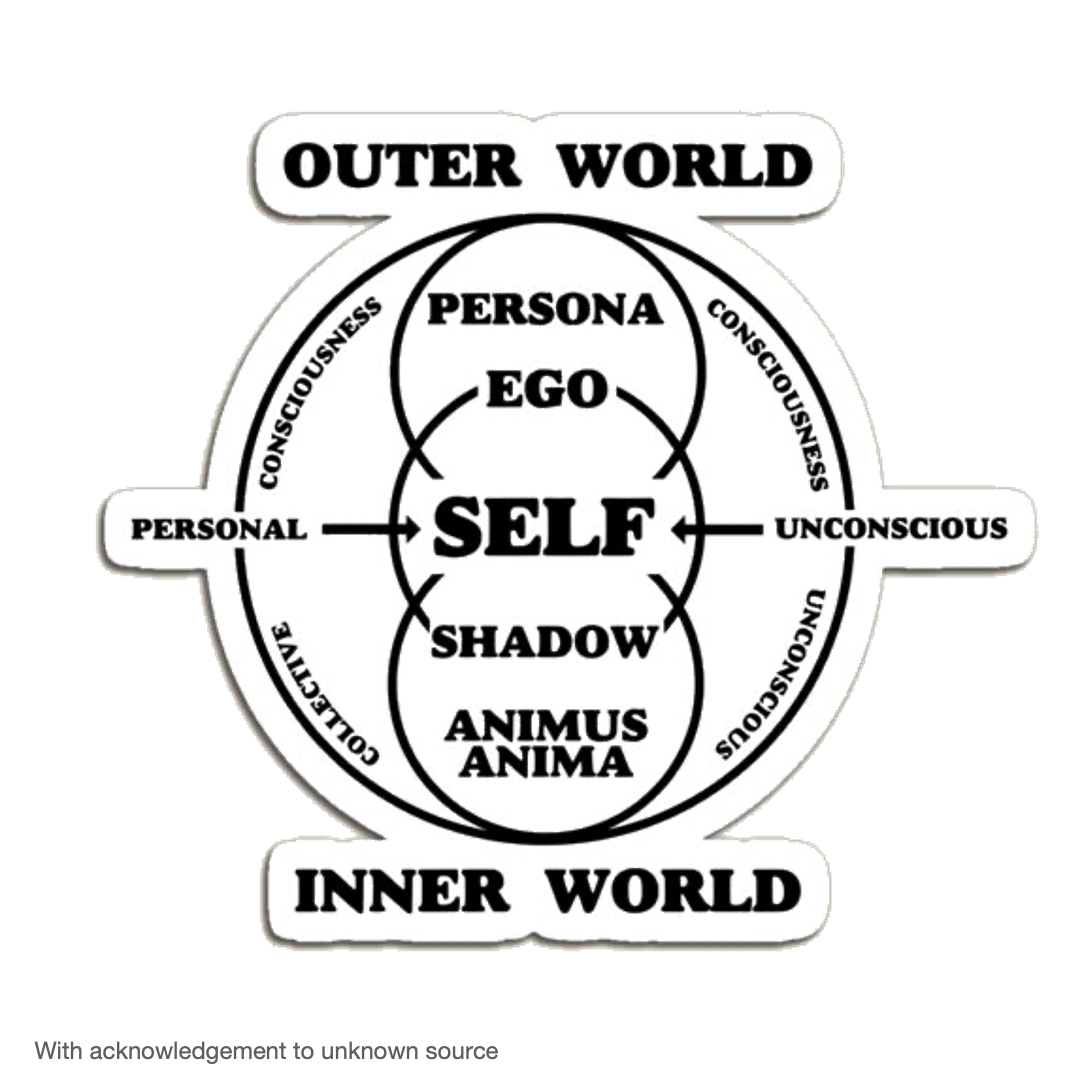
Carl Jung used the term “individuation” extensively in his work on personality development calling it an unconscious natural spontaneous process but also a relatively rare one.
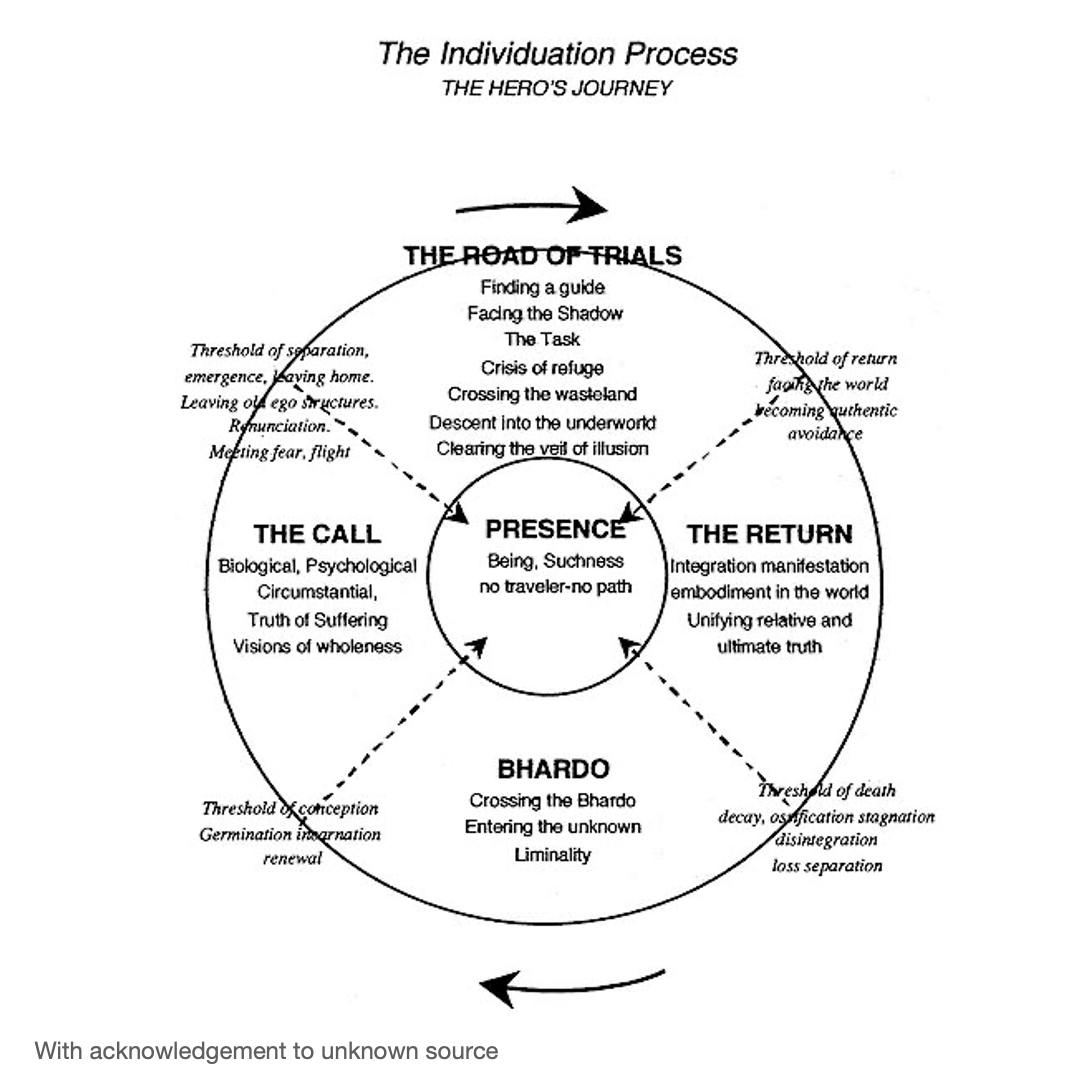
Laurence Barrett (2023) notes the process of insight and letting go represents the first two movements of the individuation process which we may term ANALYSIS and SEPARATION. The former is introspection and reflection & latter recognizing boundaries and differences.
I believe individuation is the process of discovering where SELF is in the mix of unconscious conformity (social or cultural compliance) and our role functions (at home, work, etc.)
WHAT IS A CULTURAL COMPLEX
GoTop
A cultural complex is made up of cultural traits, which are the smallest units that create a culture. Cultural traits are described as any characteristic of human action that is learned through social interaction and relationships.
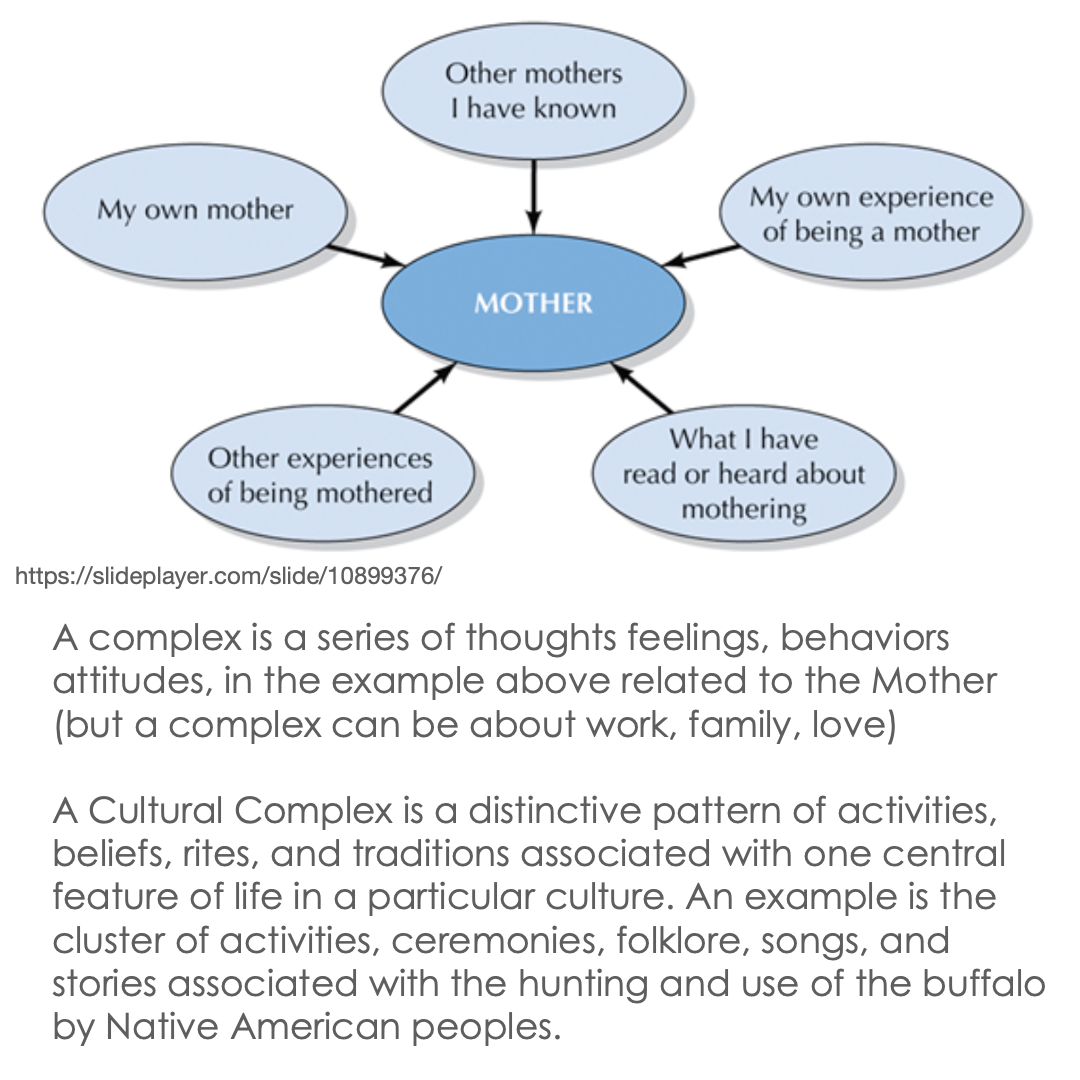
The cultural complex can possess the psyche and soma of an individual or a group, causing them to think and feel in ways that might be quite different from what they think they should feel or think. As Jung put it: “We say or do something different from what we intended.” (Jung vol. 18: para. 72) In other words, cultural complexes are not always “politically correct,” although being “politically correct” might itself be a cultural complex.
THE INTER-PLAY BETWEEN GROUP AND INDIVIDUAL
GoTop
It is the individual’s task to differentiate himself from all the others and stand on his own feet. All collective identities . . . interfere with the fulfilment of this task. Such collective identities are crutches for the lame, shields for the timid, beds for the lazy, nurseries for the irresponsible. . . . [Carl Jung 1995]
Identification facilitates early adaptation to the outside world, but in later life becomes a hindrance to individual development. For example, identification with the father means, in practice, adopting all the father’s ways of behaving, as though the son were the same as the father and not a separate individuality.
Identification with a complex (experienced as possession) is a frequent source of neurosis, but it is also possible to identify with a particular idea or belief. A practical example might be identification with a profession (I am an accountant) or team (I am a fan) or employer (I am part of the NHS).The key words in each case being “I am” such that they are owned, part-of or possessed)
It is important that we grow beyond Identification as a role, label or membership and individuate as a person. If we do not then the unconscious usually responds with violent emotions, irritability, lack of control, arrogance, feelings of inferiority, moods, depressions, outbursts of rage, etc., coupled with lack of self-criticism and the misjudgements, mistakes, and delusions which this entails.
I suspect this may be a process experienced by whistle-blowers, iconoclast, mavericks and dissidents.
GROUP THINK
GoTop
Groupthink is a phenomenon that occurs when the desire for group consensus overrides people’s common sense desire to present alternatives, critique a position, or express an unpopular opinion. Here, the desire for group cohesion effectively drives out good decision-making and problem solving.
It is possible to become possessed by the cultural complex. This is where cult like obsession or subservience not only clouds our objective reasoning, but actually compromises our identity and sense of self and responsibility.
In what author Margaret Heffernan calls wilful blindness, she notes that in the years leading up to the crash, the US housing market was expanding at a shocking pace; people with little to no income were buying lavish homes with small or non-existent down payments. Since everybody was doing it, nobody imagined that anything could be going wrong. It all comes back to a single human impulse: the unconscious urge to surround ourselves with people who think the same way that we do.
CASE STUDY
GoTop
I worked in bank during the 2008 financial crisis and it was interesting how staff identified with the organisation almost as if it were family. Indeed for some their home, insurance, employment, and health-care eggs were all in this one basket. Many staff were traumatised by the financial crisis and the emerging scandal in which they were embroiled. The corporate complex was a very personal experience leading to a lot of soul searching as well as job hunting. The feeling of betrayal and loss was far more profound than for people outside the organization, and doubtless left a legacy that has an influence on the organization even now, many years later.
In another organisation significant and rapid growth, the pursuit of success and a focus on accomplishment undermined quality, ran roughshod over caution. Those that were not fired “not being good enough” were burntout. This highly successful business was fantastic on the outside, but chaotic and uncaring on the inside. The cultural complex had both a bright and a dark side: It was exciting and terrifying, it was no bullshit and no compassion, it was get it done or get thrown out. This is not a story of Enron, Cambridge Analytica/ Facebook (mentioned below). This is a successful business with a bright and a dark side, which we tend to overlook, hide, or deny when we talk about “the way we do things here” definition of culture.
CONCLUSIONS / REFLECTIONS
GoTop
I suspect the dark side of the cultural complex will have had a similar personal impact on employees of Enron Scandal (2001), WorldCom Scandal (2002), Freddie Mac Scandal (2003), American International Group (AIG) Scandal (2005) and Lehman Brothers Scandal (2008), Volkswagen emissions scandal, Cambridge Analytica/ Facebook scandal, Oxfam Haiti allegations (2018)
The concept of cultural complex is not simply “businesses culture” it can extend to religion, politics, nations and colonies with the past storing up meanings and associations with which we may be uncomfortable.
Working with originations going through change it is often apparent that there is Level 1 rational change in people, process and technology as the organization transitions to a new operating model or platform, and also Level 2 hopes, dreams, fears and dramas of those within the business or stakeholders of it. There are plenty of rational models to guide Level 1 change (Kotter, Kublar-Ross, Lewin, ADKAR) but these rarely address Level 2 psychodynamic issues.
In a rapidly changing world, executives too frequently come up against the limits of their ability to grasp the impact of Level 1 change on their roles and on themselves. Halina Brunning’s book Executive Coaching advocates psychodynamic and psychoanalytic approaches to better understanding the following…
the client’s personality
the client’s life story
the client’s skills, competencies, abilities and talents
the client’s aspirations, career progression so far and future directions thereof
the client’s current workplace environment in which they perform
their current organisational role
These domains of enquiry seem to be a good response to the issues of individuation and the cultural complex and necessary as part of the personal transition that must follow and support the cultural change.
I think an understanding of the issues above can be helpful to the management of change, engagement and the liberation of participation.
I highly recommend A Jungian Approach to Coaching The Theory and Practice of Turning Leaders into People By Laurence Barrett and following the author on LinkedIn where you will find many interesting resources. Also Halina Brunning’s book Executive Coaching.
REFERENCES
GoTop
The Cultural Complex By Thomas Singer with Catherine Kaplinsky
https://aras.org/sites/default/files/docs/00042SingerKaplinsky.pdf
What Is Individuation?
https://www.verywellmind.com/individuation-3288007
The Jungian Shadow
https://www.thesap.org.uk/articles-on-jungian-psychology-2/about-analysis-and-therapy/the-shadow/
The Journal of Organisational and Social Dynamics
https://silo.tips/download/article-on-executive-coaching-published-by-the-journal-of-organisational-and-soc
Quotes and references for quotation, criticism or review, fairly based on public material with acknowledgement to the authors.
CONTACT
GoTop
Follow *Thinking Feeling Being*
https://www.linkedin.com/company/thinkingfeelingbeing
Philosophy, psychology, coaching and practical solutions for everyday life, work, home and purpose. We support people and organisations achieve their goals through #facilitation, #workshops, #mentoring, #mediation and sharing #changeresources
About ThinkingFeelingBeing
https://thinkingfeelingbeing.com/about/
